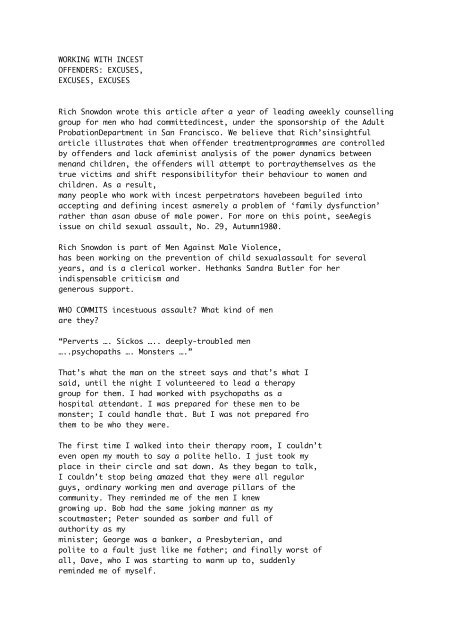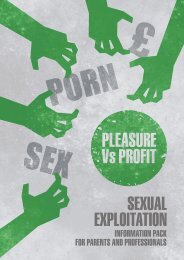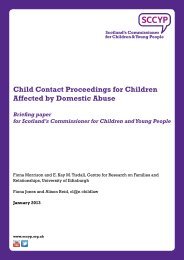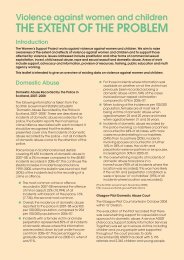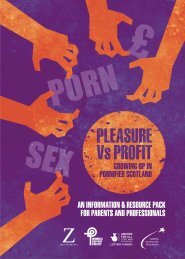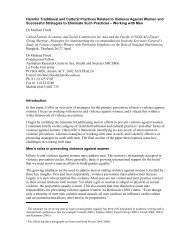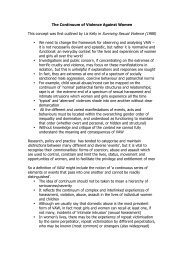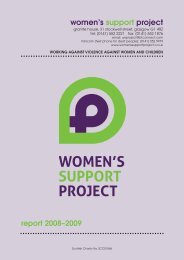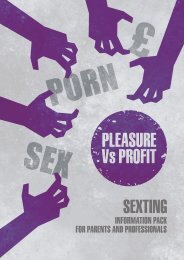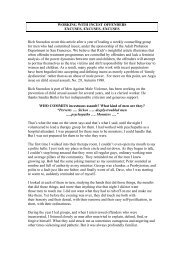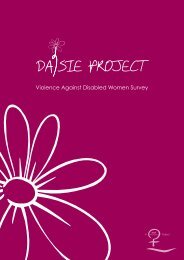WORKING WITH INCEST OFFENDERS: EXCUSES, EXCUSES ...
WORKING WITH INCEST OFFENDERS: EXCUSES, EXCUSES ...
WORKING WITH INCEST OFFENDERS: EXCUSES, EXCUSES ...
Create successful ePaper yourself
Turn your PDF publications into a flip-book with our unique Google optimized e-Paper software.
<strong>WORKING</strong> <strong>WITH</strong> <strong>INCEST</strong><br />
<strong>OFFENDERS</strong>: <strong>EXCUSES</strong>,<br />
<strong>EXCUSES</strong>, <strong>EXCUSES</strong><br />
Rich Snowdon wrote this article after a year of leading aweekly counselling<br />
group for men who had committedincest, under the sponsorship of the Adult<br />
ProbationDepartment in San Francisco. We believe that Rich’sinsightful<br />
article illustrates that when offender treatmentprogrammes are controlled<br />
by offenders and lack afeminist analysis of the power dynamics between<br />
menand children, the offenders will attempt to portraythemselves as the<br />
true victims and shift responsibilityfor their behaviour to women and<br />
children. As a result,<br />
many people who work with incest perpetrators havebeen beguiled into<br />
accepting and defining incest asmerely a problem of ‘family dysfunction’<br />
rather than asan abuse of male power. For more on this point, seeAegis<br />
issue on child sexual assault, No. 29, Autumn1980.<br />
Rich Snowdon is part of Men Against Male Violence,<br />
has been working on the prevention of child sexualassault for several<br />
years, and is a clerical worker. Hethanks Sandra Butler for her<br />
indispensable criticism and<br />
generous support.<br />
WHO COMMITS incestuous assault? What kind of men<br />
are they?<br />
“Perverts …. Sickos ….. deeply-troubled men<br />
…..psychopaths …. Monsters ….”<br />
That’s what the man on the street says and that’s what I<br />
said, until the night I volunteered to lead a therapy<br />
group for them. I had worked with psychopaths as a<br />
hospital attendant. I was prepared for these men to be<br />
monster; I could handle that. But I was not prepared fro<br />
them to be who they were.<br />
The first time I walked into their therapy room, I couldn’t<br />
even open my mouth to say a polite hello. I just took my<br />
place in their circle and sat down. As they began to talk,<br />
I couldn’t stop being amazed that they were all regular<br />
guys, ordinary working men and average pillars of the<br />
community. They reminded me of the men I knew<br />
growing up. Bob had the same joking manner as my<br />
scoutmaster; Peter sounded as somber and full of<br />
authority as my<br />
minister; George was a banker, a Presbyterian, and<br />
polite to a fault just like me father; and finally worst of<br />
all, Dave, who I was starting to warm up to, suddenly<br />
reminded me of myself.
I looked at each of them in turn, studying the hands<br />
that did those things, the mouths that did those things,<br />
and more than anything else that night I did not want<br />
those men to touch me. I did not want what they had<br />
to rub off on me and make me like them. Yet before<br />
the evening was over, they did touch me both with<br />
their honesty and their denial, with their remorse and<br />
their easy self-justification, in short, with their<br />
ordinariness.<br />
During the year I led groups, and when I interviewed<br />
offenders who were incarcerated, I listened closely as<br />
man after man tried to explain, defend, find, or forgive<br />
himself. What they said struck me as sometimes<br />
outrageous and angering and other times sickening<br />
and pathetic. But it was always profoundly familiar.<br />
Every Monday night as I sat there in the group trying<br />
to figure out how to do this work and how to make a<br />
difference, hard questions kept coming up for me<br />
about what it means to be a man. And with them<br />
came a sadness I could not dispel.<br />
I considered myself a “nice guy” who “could never do<br />
such a thing.” I wanted these men to be as different as<br />
possible. Yet as I heard them talking about childhood<br />
and their early teen years, I was less and less able to<br />
deny how much we had in common. We grew up<br />
learning the same things about how to be men.<br />
Though we practiced them in somewhat different<br />
ways or to different degrees. These were things we<br />
never asked to learn and never wanted to. Often they<br />
were forced upon us and often we did our best to<br />
resist. But that was usually not enough, and one way<br />
or another, these usually not enough, and one way or<br />
another, these lessons in masculinity got inside us.<br />
We were taught that privilege is our birthright and<br />
aggression is our nature, so we learned to take, but<br />
not o give. We learned to get affection, or express it,<br />
mainly through sex. We expected to marry a woman<br />
who would provide for us like a mother, but obey us<br />
like a daughter. And we learned that women and<br />
children belong to men, that there is nothing to keep<br />
us from using their labour for our benefit and their<br />
bodies for our pleasure and anger.<br />
It was unnerving to listen to offenders to talk and then<br />
look back over my own life. I saw how often I was
attracted to a woman who was spirited,<br />
spontaneous, caring and powerful – but not more<br />
powerful than me. What I looked for was someone<br />
with a multitude of wonderful qualities, but who at<br />
the same time would not question my definition of<br />
our relationship and would not threaten my uncertain<br />
comfort by revealing her needs to me, someone full<br />
of giving but easy to command, very much like a<br />
puppy who thinks the world of you, or a child. I had<br />
to acknowledge, too, how hard it continues to be to<br />
want, work for, and enjoy a relationship with a<br />
woman who in every important way is equal in<br />
power.<br />
During the week between groups, I tried to find a<br />
way to understand my encounters with these men<br />
and with myself, and turned to what I thought would<br />
be safely academic studies on the subject. I found<br />
important information, but no comfort. I learned that<br />
95 – 99% or offenders are male, and I had to<br />
recognise that incest is a problem with gender, a<br />
men’s problem, one that we force women and<br />
children to deal with. I had to recognise, too, that it is<br />
not a crime committed by “a few sick men who are<br />
strangers,” as I had believed most of my life. When I<br />
talked with Lucy Berliner, an expert on victimadvocacy<br />
at Harborview Hospital in Seattle, she told<br />
me that one out of every four girls is sexually<br />
assaulted at least once in growing up, and David<br />
Finklehor, author of “Sexuality- victimised Children”<br />
told me the same is true for one out of every eleven<br />
boys. Amazingly, both of them felt their estimates<br />
were conservative. And they both said that 75 – 80%<br />
of all cases, the offender is someone the child<br />
knows and often trust.<br />
The studies brought me right back to the same place<br />
my evenings in the group had taken me. I had to<br />
start thinking about millions of men, men with every<br />
social, economic, and professional background. Men<br />
who are fathers, grandfathers, uncles, brothers,<br />
husbands, lovers, friends and sons. I had to start<br />
thinking about the ordinary men of America.<br />
To say that incest offenders are “ordinary men” is to<br />
challenge ourselves to take a critical look at male<br />
socialisation and find out what is wrong with it. But it<br />
is also a statement men use as an excuse.
With increasing numbers of middle class men being<br />
identified as offenders, it’s now quite common to<br />
hear police, probation officers, attorneys, judges and<br />
therapists saying: “Most of these men are not<br />
criminals. They have no previous record. They good<br />
men who have simply made a mistake.”<br />
Once they have defined a man as “nice,” then his<br />
violence is not longer a crime, and her receives<br />
special treatment, if any treatment at all. But if a man<br />
is not defined as “nice” then his actions, no matter<br />
what his motive, will be judged by the letter of the law.<br />
An unemployed father who robs a store so he can buy<br />
food for his children is convicted as a criminal, while a<br />
successful father who has been sexually assaulting<br />
his 8-year-old daughter for five years is considered a<br />
“good man” who deserves another chance.<br />
Therapists generally report that incest offenders are<br />
not threatening men, that they are charmers and<br />
wimps, and that their acts were merely “distorted love”<br />
or “misplaced affection.” I listened carefully to these<br />
description and didn’t know what to think about them,<br />
until taken by surprise one night in the group, I found<br />
that just a little pushing will bring out what’s really<br />
beneath the surface. I started a discussion about<br />
enforcing court orders and there was suddenly a<br />
tightening of muscles, a clenching of teeth, and a<br />
pounding of fists, a display that said; no masculinity is<br />
lacking here.<br />
I sat there amid the rising anger, a grown man, and<br />
was afraid. Everything fell silent inside me. I stopped<br />
hearing the staccato echoes of the voices all around<br />
me. I could only think about a child facing one of these<br />
men alone. The fear she must feel. The bottomless<br />
anger she must know is there, even when he is using<br />
her body politely, speaking gentle encouragements to<br />
her. Even when he is opening his needs to her like a<br />
beggar, she must either obey or risk his rage. I could<br />
only think about a child who had to find a way to<br />
survive assault by herself, who unlike me, had no<br />
escape, no home of her own to go to at 10 o’ clock<br />
when the group was over.<br />
Incest offenders are men who simply have the power<br />
to take what they want and who take it. They are men<br />
much too much like any other men. And they, too, use
that fact as an excuse, hoping to get off easy when<br />
they stand before the judge.<br />
There are some offenders who have the courage to<br />
turn themselves in, and some who will tell the whole<br />
truth once they’ve been arrested and will struggle hard<br />
to change themselves, no matter how much it hurts.<br />
They are rewarding to work with, but they are rare.<br />
From start to finish. Most offenders deny what they’ve<br />
done. Den: “I didn’t do a thing. I was framed. What are<br />
they making such a big deal out of such a little thing/ I<br />
just gave her a kiss and they say I raped her. Isn’t a<br />
father supposed to give his daughter a kiss?” Yale: “I<br />
didn’t commit incest and anyone who says I did can<br />
step out back with me and we’ll settle this like a man.”<br />
Under pressure, some will come around to admitting<br />
that maybe something a little like incest might have<br />
happened once or twice. But then they adamantly<br />
deny any responsibility for it and claim instead that<br />
they are themselves the true victims. The clever fiction<br />
they invent to support this claim is much more<br />
powerful, damaging, and dangerous than their<br />
stubborn denial ever could be.<br />
Operating on the theory that the best defence is a good<br />
offence, they try to soften our hearts by telling us they<br />
are innocents who fell into the hands of a provocative<br />
child or a bad mother. They figure if they can make<br />
someone else look like the monster, they can get off as<br />
nice guys. Through the stories they tell, they construct<br />
their fearful version of family – Lolita, The Wicked Witch<br />
and Santa Claus.<br />
Lolita: The Child as Seducer<br />
Lolita is the fist of their three descriptions, and whom<br />
each of them seems to have for a daughter. The plot is<br />
usually the same, though each man adds his personal<br />
touch. Jack: “She was always walking around halfnaked,<br />
waggling her behind, so I did something about<br />
it.” Zachary: “She’s a regular little Brooke Shields, how<br />
she dresses. Little girls grow up fast now. They’re just<br />
like women. They all want it.” Thomas: “She kept<br />
coming to me and putting her arms around me or<br />
climbing into my lap. She kept wanting me to be<br />
affectionate with her. One thing led to another. She said<br />
‘no’ when it got to sex, but I didn’t believe her,. Because
why did she want all that other stuff then?” Frank: “My<br />
daughter’s a devil. That’s not a figure of speech. I mean<br />
exactly what I say.”<br />
These men are as fast as TV scriptwriters and as facile<br />
as professional pornographers, the way they turn out<br />
line after line about the dangerous desires of little girls<br />
and how they’re always getting men into such trouble.<br />
Not only do they cast girls as sex objects, but also as<br />
aggressors, as “demon nymphettes.” They define not<br />
only the child’s body but also her soul.<br />
Florence Rush, in The Best-Dept Secret, a remarkable<br />
history of child sexual assault, shows how deep this<br />
hatred of girls goes. She explains how Freud based her<br />
theory and built his practice on Lolita, a lie he did so<br />
much to develop and to credit.<br />
In his essay on “Femininity,” he wrote “… almost all my<br />
women patients told me that they had been seduced by<br />
their father.” But he could not bring himself to believe<br />
that so many men in civilised Vienna were sexually<br />
abusing their daughters. So instead he decided that<br />
these women who had trusted him with their most<br />
painful secrets were lying. But that was not the end of it.<br />
He claimed that whenever girls report assault, they are<br />
actually revealing their innermost fantasies, expressing<br />
their true nature, and that their expressions mean that<br />
they want to be “seduced.” Or in the words of Lennie<br />
and Hank: “She asked for it.”<br />
In our culture this message is so prevalent and<br />
forceful, that it is no wonder that girls take it in and then<br />
blame themselves when they are assaulted. It’s no<br />
wonder that so many of them believe they actually are<br />
Lolita.<br />
Carlos, sentenced to three years at Atascadero, a<br />
maximum security state hospital for sex offenders,<br />
tells the simple truth about Lolita to anyone who will<br />
listen: “Of course she seduced me, but that was only<br />
because I seduced her into seducing me … I was the<br />
adult. I was responsible.” Carlos had once turned on<br />
the Donahue Show and seen Kathy Brady, an incest<br />
survivor who wrote Father’s Days, telling the story of<br />
her life. He had broken down and cried his way<br />
through the programme. Listening for the first time<br />
with his heart, not with his defences, and at last had<br />
begun to understand his daughter’s terror. It was the
truth told from the point of view of the child and the<br />
woman that therapy started.<br />
The Wicked Witch: The Evil Mother<br />
The second deception offenders use is The Wicked<br />
Witch, to whom each of them seems to be married.<br />
Even when the victim’s mother is disabled because of<br />
illness or injury, or because she was assaulted as a<br />
child herself and has learned all too well her lessons<br />
of submissiveness and despair. She is nonetheless<br />
labelled “the collusive mother” or “the silent partner,”<br />
terms invented by therapists implying a latent<br />
malevolence.<br />
Offenders follow this theme to its conclusion, telling<br />
stories that come right out of Hansel and Gretel: A<br />
well-meaning, natural father is brow-beaten by an<br />
insistent, controlling wife into doing something terrible<br />
to his children. The villains are female, both the<br />
“unnatural” stepmother and her reflection, The Wicked<br />
Witch. Any woman whose “innate” mothering instincts<br />
have “failed” been defeated, or turned “vindictive,” is<br />
cloaked with an aura of evil, either fated or willful.<br />
Ulrich put it this way, “My wife was always nagging<br />
and bitching at me. She wouldn’t give me sex. But my<br />
daughter looked up to me. She made me feel like a<br />
man. So I went to her for everything.” Evan said: “My<br />
wife kept pressuring me to be around more and be<br />
more involved with the children. Meanwhile she was<br />
always cooking and cleaning and complaining about<br />
being tired. She didn’t pay much attention to me or the<br />
kids. So I just started getting into mischief with them,<br />
and with my daughter it was molestation.”<br />
“My wife made me do it, it was her fault,” is the<br />
spoken or unspoken message. It’s a contagious<br />
excuse. Once one man in a group picks up on it,<br />
there’s an epidemic. Yet one night when I reminded<br />
Quentin that he couldn’t miss even one session<br />
unless he had a genuine emergency, he shouted<br />
back, “Don’t tell me what to do. Nobody is going to<br />
make me do something I don’t wanna.” He couldn’t<br />
have made it clearer. No woman and no child makes<br />
a man commit assault.<br />
When offenders describe the elaborate<br />
plans they made and carried out to keep their violence
a secret, they give proof that they are the ones who<br />
should be held responsible, especially those who admit<br />
they stopped at nothing to terrify their children into<br />
submission and silence: “If you tell anyone, I’ll kill you.”<br />
Or, “If you tell your mother, I’ll kill her.”<br />
Yet men commonly think that mothers are supposed to<br />
save the family from any and all problems, including<br />
incest, that they are supposed to protect the daughter,<br />
from the father and the father from himself. As a result,<br />
both offenders and therapists often join in blaming the<br />
mother. If a mother knows, but doesn’t tell for fear of not<br />
being believed or because she is afraid to send the<br />
family’s means of support to jail, she is blamed for not<br />
protecting her child. If she doesn’t know and therefore<br />
can’t tell (the majority of cases), then she is blamed for<br />
not knowing, as if she should never have let her<br />
daughter out of her sight, not even in her own home.<br />
Finally, if she finds out and tells, she is blamed for<br />
breaking up the family. It’s as if she should have fixed<br />
everything in private, as if she should have been able to<br />
cure her husband overnight by herself, the same man<br />
who professional therapists are hard-pressed to change<br />
even after years of court-ordered therapy.<br />
Time and time again, when I told people about the<br />
counselling I was doing, they expressed disgust at what<br />
the men did, but rage at the mothers. It was as though<br />
nothing more could be expected of a man, but if a<br />
mother was unable to protect her child, no matter what<br />
the reason, then she could never ‘be forgiven’.<br />
It is no wonder that the most common feeling mothers<br />
have is a devastating guilt. It is no wonder that so many<br />
believe they actually are The Wicked Witch.<br />
Some offenders, following directly in the footsteps of a<br />
growing number of professionals, back off from such an<br />
open attack on mothers. In their drive to present<br />
themselves as compassionate and understanding, they<br />
want softer words and the appearance of accepting<br />
shared responsibility. They learn to translate “mother!<br />
Into “family” and turn book titles like The Abusing<br />
Family into household phrases. But whenever they say<br />
“family,” “mother” is what they mean. For in our culture,<br />
mother is the one who is responsible for what happens<br />
at home. It is nice if the man takes an interest and helps<br />
out, but the buck stops with her.<br />
Sandra Butler, who wrote the very readable and
extremely helpful book Conspiracy of Silence, The<br />
Trauma of Incest, answered this cowardly lie, saying<br />
simply “Families don’t assault children sexually. Men<br />
do.”<br />
Santa Claus: The Generous Father<br />
The third deception offenders use is Santa Claus,<br />
whom each of them pretends to be, the man known<br />
for giving children presents, for giving them “what they<br />
like and what they ask for.” They talk about<br />
themselves of this kindly Father-Knows-Best. Stanley:<br />
“It wasn’t like I was hurting someone. I was giving her<br />
some affection I thought she needed.” Ian: “I was<br />
trying to teach her about sex. I didn’t want her learning<br />
it from some dirty minded boy down the block. I<br />
wanted it to be gentle and caring for her.”<br />
Glen molested tow out of his three children. He said<br />
he was responding to their pain: “I loved them, but<br />
they were not happy kids. I wanted to help them. With<br />
my 7-year-old daughter, I saw her, I loved her, and I<br />
should have picked her up and given her a hug.<br />
Instead I put my penis between her legs. With my 14yearold<br />
son, it started out with back rubs and went<br />
from there. Eventually he had a hot and heavy affair<br />
with me. But don’t think I’m queer or a molester per<br />
se. I just didn’t know any other way to show my love.”<br />
“Why didn’t you assault your oldest son?”<br />
“He was a different kind of person. He was selfsufficient<br />
and independent. He didn’t need me like the<br />
other two did.”<br />
Eric, who described himself as a poet, “thoughtful,<br />
gentle, and caring,” told me: “my stepdaughter was 14<br />
and she wasn’t doing too well at should. Her grades<br />
were okay, but she didn’t have any friends, so she<br />
was depressed and alone a lot. Her mother was<br />
transferred to the evening shift at the hospital, so she<br />
wasn’t around as much and that didn’t help either.<br />
One night I woke up and heard Laura crying out in the<br />
hall by the heater, so I went out there, put my arms<br />
around her, held her, and talked to her. Before going<br />
back to bed, she said, “Daddy, would you hold me<br />
whenever I need to be held?” I said, “Okay.” Later with<br />
the two of us getting closer and closer, it turned to<br />
sex.” He continued to give his stepdaughter his kind of
“nurturing” even during the period when he was<br />
having intercourse with her-when she became suicidal<br />
and “needed to be held more than usual.”<br />
There are some men who set aside the Santa<br />
disguise and reveal the dynamics of incest with a<br />
terrible, but honest arrogance. Alan: “My child’s body<br />
is as much mine as it is hers.” Vince: “She told me,<br />
you have to.” Mike: “I pick on children because their<br />
safer, that’s all. They don’t talk back to you like a<br />
woman.” Rod: “She’s my girl, so that gives<br />
me the right to do anything with her I want<br />
to. So stick your nose out of it; my family ismy business.”<br />
These fathers acknowledge that they could do what<br />
they did only because they could make their children<br />
obey and could command silence. They used nothing<br />
more than the power any ordinary father has.<br />
Yet it is this very power that most men deny when they<br />
are caught and convicted. Once proud to be in charge,<br />
they suddenly characterise themselves as incapable of<br />
taking control of anything, including their own actions.<br />
Xavier: “I didn’t know what I was doing. How did this<br />
happen to me” Walt: She asked me to do it, and I just<br />
went along with it. I never could say ‘no’ to her.” Owen:<br />
“I fell in love with my daughter. I mean I really fell in love<br />
with her. After that I couldn’t stop myself.”<br />
They argue that they were helpless prey in the face of<br />
Lolita’s intimidating schemes. Once she turned them<br />
on, they were at her mercy and could no longer be held<br />
accountable. When a man thinks like this, it doesn’t<br />
matter what his daughter says or does not say, does or<br />
does not do; just by being a girl in a girl’s body, she is<br />
the incarnation of seduction. She is a “natural<br />
temptation” to which his “natural impulses” make him<br />
completely vulnerable. So he can scarcely be expected<br />
to resist. He believes he is a hero if he refuses to<br />
succumb and an ordinary guy if he “gives in.”<br />
As long as these men deny their own power and the<br />
power of men as a group, they also deny the<br />
responsibility men share, and so nothing changes. They<br />
deny that they can respond to stress with solutions<br />
instead of assault: “My boss was critical of me all the<br />
time. My son was picked up by the police for stealing<br />
cars. My wife couldn’t stand to be around me anymore.<br />
I was trying to take care of everything by myself. No
one was looking after me. That’s where my daughter<br />
came in.”<br />
They deny that they can change themselves, despite<br />
their socialistion: “My conditioning made me do it. I’m a<br />
slave to my conditioning.” Or, “I’m sick … I’m evil … I’m<br />
messed up … There’s nothing I can do about it, so<br />
there’s nothing I have to do about it, so leave me<br />
alone.”<br />
They deny that fathers can learn to nurture their<br />
children instead of requiring the reverse, especially<br />
making their daughters serve as little mothers: “I<br />
thought children were supposed to be magic and cure<br />
my hurts. Kiss me and make it all better.”<br />
The men in my group told me over and over that they<br />
were tired of being identified as offenders and<br />
having to talk about assault all the time. They said they<br />
just wanted to have their families living together again<br />
“like other families,” and to get back to being “regular<br />
fathers like other men are.” If only it were that easy.<br />
But given the men grow up, it can’t be. And the<br />
challenge they continue to face is one I had to face<br />
with them – to understand that being an “ordinary<br />
man” is not enough – not for any of us.<br />
Norm told me: “The first step is saying, ‘Yes, I did it. I<br />
have a problem.’ But that’s only the first step. The<br />
second step is to start tearing yourself apart and<br />
rebuilding.”<br />
“How deep does the tearing apart have to go?”<br />
“All the way down. It has to go all the way down to the<br />
core. Every little hole and cranny that something is<br />
hidden in – that has to be pulled out. Every bit of it.<br />
None of it can stay down there. You can’t say, ‘Well,<br />
this is my sexual part, I can just deal with that.’ No<br />
way. It ‘s the whole being that has to be ripped apart<br />
and rebuilt again. I’m finding that leaves a big empty<br />
void inside me. An emptiness that used to be filled<br />
with something I didn’t like. But I like what I’m putting<br />
back in. I’m finding something to put back in there<br />
that’s fresh.”<br />
Lamond explained, as we were sitting by his window<br />
looking out through the bars: “We all knew what we<br />
were doing was wrong, but we each had stories we
told ourselves, so we could keep on doing it.”<br />
Lolita, The Wicked Witch, And Santa Claus are those<br />
stories. They are not tales men read to their daughters<br />
and sons at bedtime to help them fall peacefully<br />
asleep, but stories they make their children live.<br />
Stories of endless terror.<br />
When we were boys, we didn’t have the power to stop<br />
lies and violence, but now we are men, we do. We<br />
have the power to tell the truth. We have the power to<br />
stand with boys who are growing up now and help<br />
them defend their caring. We have the power to stop<br />
being “ordinary guys” and become something much<br />
better – men with whom children and women can be<br />
safe.<br />
Reproduced by: Women’s Support Project.<br />
women’s support project<br />
granite house, 31 stockwell street, glasgow G1 4RZtel: (0141) 552 2221 fax:<br />
(0141) 552 1876email: wsproject@btconnect.com minicom (text phone for deaf<br />
people): (0141) 552 9979<br />
<strong>WORKING</strong> AGAINST VIOLENCE AGAINST WOMEN AND CHILDREN


